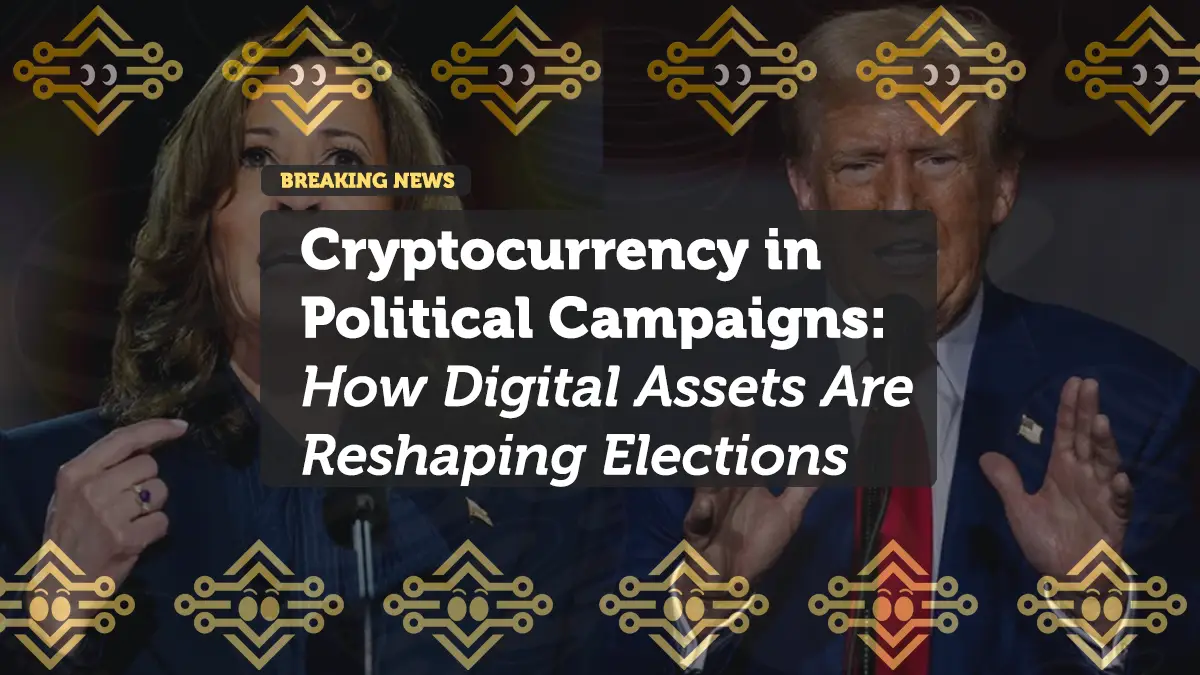
Cryptocurrency in Political Campaigns: How Digital Assets Are Reshaping Elections
The integration of cryptocurrency into political campaigns is an emerging trend that reflects both the growing acceptance of digital assets and the innovative approaches candidates are using to engage with tech-savvy voters and donors.
As cryptocurrencies continue to gain mainstream adoption, their role in political fundraising and campaign financing is becoming more significant. What does this mean for the future of elections? Let’s break it down. The Federal Election Commission (FEC) in the United States has allowed political campaigns to accept cryptocurrency donations since 2014, categorizing them as “in-kind contributions.” This ruling has enabled candidates at both the federal and state levels to explore digital assets as a funding source, though with certain restrictions and reporting requirements.
State-Level Regulations
While federal candidates can accept crypto donations, state laws vary significantly:
- Colorado and Tennessee allow crypto donations but require conversion to U.S. dollars immediately upon receipt.
- California had previously banned crypto donations in state elections but later reconsidered, implementing strict reporting and transparency measures.
- Other states, such as South Carolina, still prohibit political crypto contributions due to concerns over transparency and foreign influence.
With regulatory scrutiny increasing, campaigns accepting crypto must adhere to anti-money laundering (AML) laws and ensure compliance with campaign finance laws.
High-Profile Political Figures Accepting Crypto
Several notable candidates and political figures have embraced cryptocurrency donations, signaling a shift in how campaigns view digital assets.
Donald Trump
The Trump 2024 campaign announced it would accept Bitcoin (BTC), Ethereum (ETH), and other cryptocurrencies through Coinbase Commerce, a move aimed at supporting financial freedom and decentralization. This decision aligns with Trump’s pro-crypto stance and his administration’s broader efforts to position the U.S. as a leader in blockchain innovation.
Robert F. Kennedy Jr.
An independent presidential candidate, Robert F. Kennedy Jr. has been one of the most vocal supporters of Bitcoin. His campaign was among the first in the 2024 election cycle to accept crypto donations, further legitimizing digital assets in mainstream politics.
State and Local Candidates
Beyond federal elections, state and local candidates have also experimented with crypto donations, viewing them as a way to:
- Engage younger, tech-savvy voters
- Differentiate their campaigns from traditional finance-backed competitors
- Attract international attention and grassroots support
The Benefits and Challenges of Crypto in Campaigns
While crypto donations offer numerous advantages, they also present significant challenges that campaigns must navigate.
Advantages of Crypto Donations
✔ Expanding Donor Base – Crypto allows candidates to tap into a new demographic of investors and blockchain enthusiasts who may not typically contribute via traditional finance.
✔ Decentralized and Censorship-Resistant – Unlike traditional banking methods, crypto donations bypass financial intermediaries and reduce restrictions in countries with strict capital controls.
✔ Transparency and Blockchain Verification – Blockchain technology ensures that all transactions are publicly verifiable, reducing concerns about financial fraud.
Challenges and Risks
⚠ Volatility – The value of cryptocurrency can fluctuate drastically, making it difficult to predict the real-world value of donations over time.
⚠ Regulatory Concerns – The FEC and IRS require detailed reporting of crypto donations, which can add complexity to campaign finance management.
⚠ Foreign Influence Risks – Cryptocurrency’s pseudo-anonymous nature raises concerns about illegal foreign contributions, which are prohibited under U.S. election laws.
⚠ Conversion and Compliance – Campaigns must immediately convert crypto to fiat currency or risk potential losses due to market volatility.
How Crypto Donations Could Influence Elections
The growing acceptance of cryptocurrency in political fundraising is set to shape the future of election financing in several ways:
1. Policy and Legislative Influence
Candidates who receive large amounts of crypto donations may support pro-crypto policies, leading to favorable regulations for digital assets, decentralized finance (DeFi), and blockchain innovation.
2. Institutional and Corporate Adoption
As political campaigns integrate crypto, large institutions and corporations may follow suit, increasing mainstream acceptance of digital assets in financial markets.
3. Transparency and Election Integrity
Blockchain technology could be leveraged beyond donations—for voting systems, identity verification, and election security, enhancing public trust in the electoral process.
Future Outlook: Will Crypto Dominate Campaign Financing?
While cryptocurrency donations are still a niche funding method, the increasing integration of digital assets into politics suggests a long-term shift. With regulatory clarity improving and public adoption growing, crypto may become a standard feature in political financing.
However, whether crypto will dominate campaign financing depends on:
- Future U.S. regulations on digital assets
- Public trust in blockchain-based financial systems
- Candidate and voter sentiment toward decentralized finance
Final Thoughts: The Intersection of Crypto and Politics
The use of cryptocurrency in political campaigns is a testament to how digital assets are shaping financial systems and governance worldwide. With major candidates embracing crypto and regulatory bodies addressing compliance issues, the 2024 and 2025 election cycles could set new precedents for blockchain-powered political fundraising.
What do you think? Could cryptocurrency donations become the future of political fundraising?










